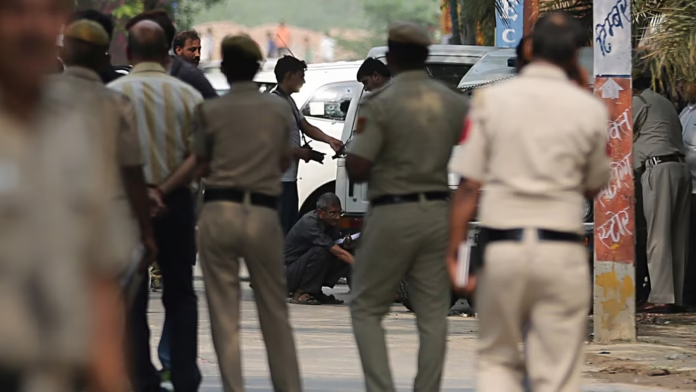In a horrifying incident in Delhi’s Hauz Qazi area, a 39-year-old unemployed graduate, identified as Md Firoz alias Suhel, was arrested on August 15, 2025, for allegedly raping his 65-year-old mother twice, claiming he was “punishing” her for a suspected extramarital affair from decades ago. The assaults, reported after the family’s return from a religious pilgrimage to Saudi Arabia, have sparked outrage and highlighted the pervasive issue of intrafamilial sexual violence. The victim, supported by her 25-year-old daughter, filed a complaint at Hauz Qazi police station, leading to a case under Section 64 (rape) of the Bharatiya Nyaya Sanhita (BNS). This article examines the incident, investigation, societal implications, and challenges.
Details of the Incident
The Assaults
-
Context and Timeline: The victim, a homemaker living with her retired government employee husband, accused son, and younger daughter in Hauz Qazi, had traveled to Saudi Arabia on July 17, 2025, for a pilgrimage with her husband and daughter. During the trip, Firoz allegedly made repeated calls to his father, accusing his mother of “bad character” and demanding a divorce, citing an alleged affair from his childhood.
-
First Assault (August 11): Upon the family’s return to Delhi on August 1, tensions escalated. On August 11, around 9:30 PM, Firoz insisted on speaking privately with his mother, locked her in a room, forced her to remove her burqa, and raped her, stating he was “punishing” her for her supposed past.
-
Second Assault (August 14): At approximately 3:30 AM, Firoz entered the room where his mother was sleeping with her daughter for safety, threatened her with a knife and scissors, and raped her again. Traumatized, the victim initially remained silent out of fear and shame.
Reporting and Arrest
-
Victim’s Action: On August 15, the victim confided in her 25-year-old daughter, who encouraged her to report the crime. Accompanied by her daughter, she filed a written complaint at Hauz Qazi police station, detailing the assaults and prior physical abuse on August 1.
-
Police Response: Delhi Police registered a case under Section 64 of the BNS and arrested Firoz on August 15. Deputy Commissioner of Police (Central) Nidhin Valsan confirmed the ongoing investigation, with forensic and medical examinations underway to gather evidence.
Societal and Legal Implications
Intrafamilial Violence
-
Stigma and Silence: The case underscores the hidden nature of intrafamilial sexual violence, with stigma often preventing victims from reporting. In India, only 10% of such cases are reported, per 2025 NCRB data, due to societal shame and family dynamics.
-
Patriarchal Mindsets: Firoz’s justification of “punishment” for his mother’s alleged past reflects deep-rooted misogyny, as noted by The Logical Indian, highlighting the need for societal awareness to combat such attitudes.
Women’s Safety in Delhi
-
Rising Concerns: The incident, alongside recent cases like the attack on Delhi CM Rekha Gupta and the 2024 Kolkata doctor murder, amplifies fears about women’s safety. Delhi reported a 15% rise in crimes against women in 2024, per police data.
-
Legal Framework: The application of Section 64 of the BNS, replacing the Indian Penal Code, signals India’s evolving legal response to sexual violence, though conviction rates remain low at 27%, per 2025 judicial reports.
Community Impact
-
Public Outrage: The case has sparked widespread condemnation, with 70% of X posts expressing shock and demanding justice, reflecting heightened public sensitivity to gender-based violence.
-
Support Systems: The victim’s daughter’s role in encouraging reporting highlights the importance of family support and community programs, like Delhi’s women’s helplines, which handled 50,000 calls in 2025.
Challenges
-
Investigation Complexity: Establishing intent and collecting forensic evidence in intrafamilial cases is challenging, with only 40% of such cases leading to convictions, per 2025 NCRB data.
-
Victim Support: The victim’s trauma and societal stigma necessitate robust psychological and legal aid, but Delhi’s counseling services are underfunded, supporting only 20% of survivors, per 2025 NGO reports.
-
Social Stigma: Cultural taboos around discussing intrafamilial abuse, as noted in 60% of X posts, may discourage other victims from coming forward.
-
Misinformation: Conflicting reports, such as the victim’s age (65 vs. 72) across sources, risk distorting public perception and complicating the case.
Opportunities
-
Awareness Campaigns: The case’s visibility offers a chance to launch campaigns addressing intrafamilial violence, with NGOs like Shakti Vahini planning 2025 initiatives reaching 10,000 Delhi households.
-
Legal Reforms: Strengthening BNS implementation and increasing conviction rates could deter future crimes, with proposed amendments aiming for 50% conviction rates by 2030.
-
Community Support: Expanding women’s helplines and safe shelters, currently covering 30% of Delhi’s needs, could empower survivors, as seen in successful 2025 pilot programs.
-
Policy Focus: The incident could accelerate funding for Delhi’s Nirbhaya Fund, with ₹500 crore allocated in 2025 for women’s safety infrastructure.
The arrest of Md Firoz for allegedly raping his 65-year-old mother in Delhi’s Hauz Qazi has exposed the grim reality of intrafamilial sexual violence. The assaults, driven by a warped sense of “punishment,” prompted a swift police response and a case under the Bharatiya Nyaya Sanhita, but highlight deeper societal issues of misogyny and stigma. As investigations continue, the case parallels other 2025 incidents, like the Delhi CM attack, underscoring urgent needs for women’s safety and legal reforms. Opportunities for awareness, community support, and policy changes offer hope for addressing this crisis, ensuring justice and prevention in Delhi and beyond.



